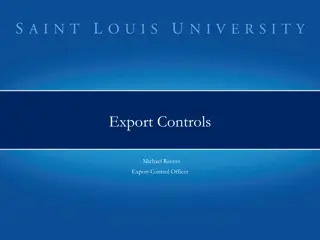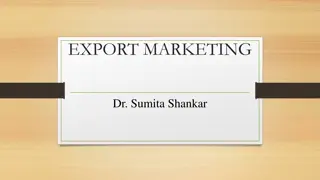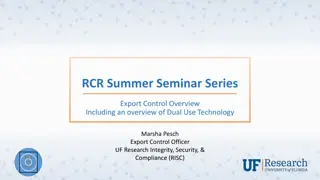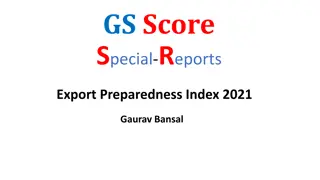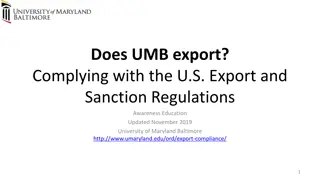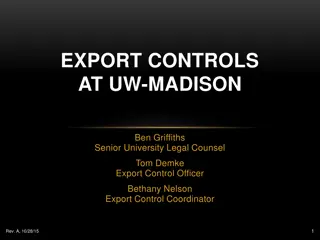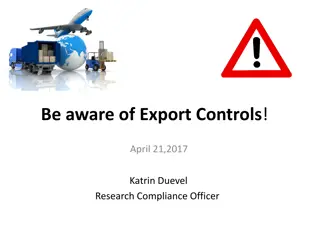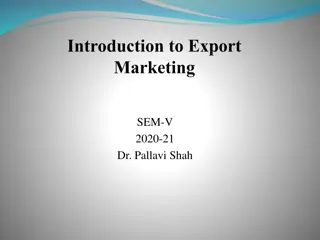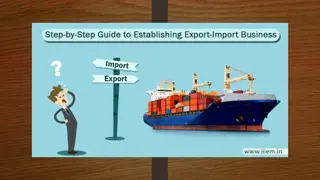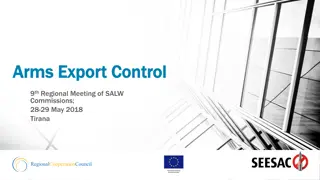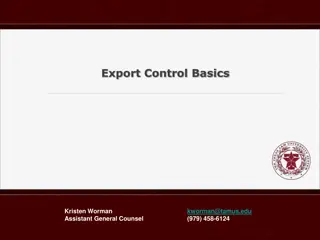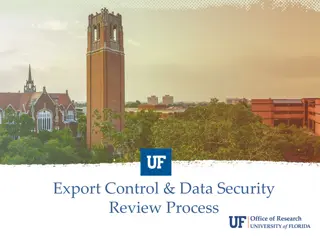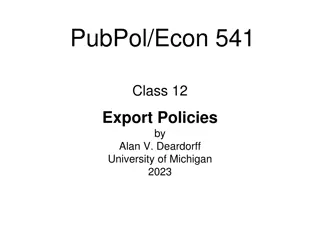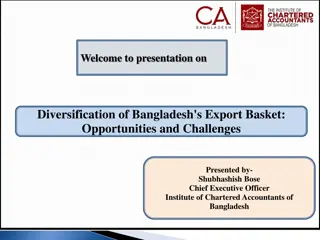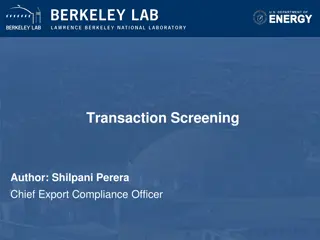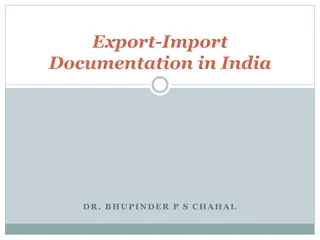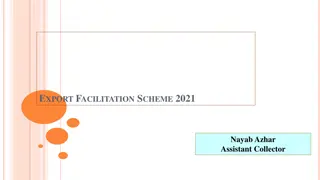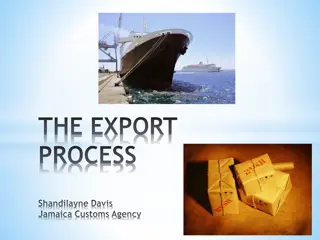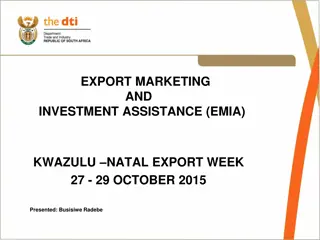Export Control Basics for an FSO
In this comprehensive guide, Valarie Kolis covers essential aspects of export control for Foreign Service Officers (FSOs). Topics include Trade Compliance Programs, Empowered Official roles, ITAR registration, International Traffic in Arms Regulations, Export Administration Regulations, licensing, technology control plans, and more. Understanding these concepts ensures FSOs comply with export laws effectively to mitigate risks and ensure national security.
Download Presentation

Please find below an Image/Link to download the presentation.
The content on the website is provided AS IS for your information and personal use only. It may not be sold, licensed, or shared on other websites without obtaining consent from the author. Download presentation by click this link. If you encounter any issues during the download, it is possible that the publisher has removed the file from their server.
E N D
Presentation Transcript
Export Control Basics for an FSO What you need to know! Valarie Kolis
You will understand how the Trade Compliance Programs & Insider Threats Program intersect Empowered Official / Trade Compliance Manager/Officer (ITAR) Registering with the Department of State (ITAR) International Traffic In Arms Regulations (ITAR) Export Administration Regulations (EAR) What is Technical Data? Deemed Export Rule Foreign National or Person Licensing Restricted Party Screening Technology Control Plan, what is it? Master Facility and Technology Control Plan Elements Information Systems (Security of Information) Reporting Threats and Reporting Trade Compliance Issues How do we tie this information all together? Compliance Order of Review Scenario
Empowered Official (ITAR) Empowered Official (ITAR) a U.S. person who: (the EO may also be the Trade Compliance Manager/Officer) (1) Is directly employed by the applicant or a subsidiary in a position having authority for policy or management within the applicant organization; and (2) Is legally empowered in writing by the applicant to sign license applications or other requests for approval on behalf of the applicant; and (3) Understands the provisions and requirements of the various export control statutes and regulations, and the criminal liability, civil liability and administrative penalties for violating the Arms Export Control Act and the International Traffic in Arms Regulations; and (4) Has the independent authority to: (i) Inquire into any aspect of a proposed export, temporary import, or brokering activity by the applicant; (ii) Verify the legality of the transaction and the accuracy of the information to be submitted; and (iii) Refuse to sign any license application or other request for approval without prejudice or other adverse recourse.
Registering with the Department of State (ITAR) All manufacturers, exporters, and brokers of defense articles, related technical data and defense services as defined on the United States Munitions List (Part 121 of the ITAR) are required to register with the Directorate of Defense Trade Controls (DDTC). Registration is primarily a means to provide the U.S. Government with necessary information on who is involved in certain manufacturing, exporting and brokering activities. Registration does not confer any export rights or privileges, but is a precondition for the issuance of any license or other approval for export. (Annually)
International Traffic In Arms Regulations (ITAR) 1. The Arms Export Control Act of 1976, as amended, authorizes entitled Control of Arms Exports and Imports a) designate those items which are considered as defense articles and defense services, and b) Designates how to control their import and the export. 2. The items designated make-up the United States Munitions List and are regulated through the U.S. Department of State, Office of Defense Trade Controls. a) Some listings are broad, so typically engineers will determine the classification b) Basic concept-items developed specifically for military use.
Export Administration Regulations (EAR) 1. The Export Administration Act of 1979 authorized the President to regulate exports of civilian goods and technologies (equipment, materials, software, and technology, including data and know- how) that have military applications (dual-use items). 2. The items designated constitute the United States Commerce Control List (CCL) and are regulated through the U.S. Department of Commerce, Bureau of Industry and Security. a) Some listings are broad, so typically engineers will determine the classification. Due to Export Reform some military specific use items are now in the CCL. b) Typically contains civil use articles.
What is Technical Data? Technical data means: (1) Information, other than software as defined in 120.10(a)(4), which is required for the design, development, production, manufacture, assembly, operation, repair, testing, maintenance or modification of defense articles. This includes information in the form of blueprints, drawings, photographs, plans, instructions or documentation. (2) Classified information relating to defense articles and defense services on the U.S. Munitions List and 600-series items controlled by the Commerce Control List; (3) Information covered by an invention secrecy order; or (4) Software (see 120.45(f)) directly related to defense articles. (b) The definition in paragraph (a) of this section does not include information concerning general scientific, mathematical, or engineering principles commonly taught in schools, colleges, and universities, or information in the public domain as defined in 120.11 of this subchapter or telemetry data as defined in note 3 to Category XV(f) of part 121 of this subchapter. It also does not include basic marketing information on function or purpose or general system descriptions of defense articles.
Deemed Export Rule The deemed export rule is the release of controlled technology and information to a non-U.S. person regardless of where the export takes place. A non-U.S. person can be a foreign national, a foreign government entity, a foreign company, a foreign military, or anyone who is not legally considered a U.S. person under the terms of the Export Administration Regulations (EAR) and the International Traffic in Arms Regulations (ITAR). Once the technology is released to the foreign national, the U.S. government considers it deemed to be an export to the individual s home country. Most often, deemed exports occur in your U.S. office, over the phone, through email, or during meetings.
Foreign National or Person Not a U.S. Citizen Not a permanent resident alien Has not actually be granted asylum Does not poses a Green Card You may have foreign employee s or foreign visitors that will be in your facility. Each will need to have special precaution's taken to allow in a facility that manufacture ITAR or EAR controlled goods.
Licensing All companies involved in any controlled technology, whether EAR or ITAR, must make it a priority to determine whether a license is required long before any activity takes place. Under the ITAR, a deemed export, hardware or the physical transfer of technology would require a DSP-5 license, Technical Assistance Agreement (TAA), or Manufacturing License Agreement (MLA) as applicable. If you are uncertain as to whether you need a deemed export license or an ITAR license, you should seek appropriate assistance from your compliance professional or direction from DDTC before beginning any activity.
Restricted Party Screening In addition to determining licensing requirements, companies should carefully screen all foreign nationals, visitors, potential employees, international buyers and even vendors. While the regulations do not specifically require extensive background checks and screening, implementing robust compliance procedures can help minimize risk exposures and potential violations. Companies should also integrate regular self-assessments into their compliance plan as an added measure to minimize liabilities. A robust compliance policy will cover when and how to apply for a deemed export license long before any deemed export activity takes place.
Technology Control Plan, what is it? The purpose of a TCP is to establish access controls and protective security measures necessary to prevent access by unauthorized employees, business partners, and visitors to sensitive intellectual property or proprietary information, classified information and export-controlled technology, information, equipment or services. U.S. export control regulations govern tangible and intangible transfers of export-controlled technology, technical data, technical assistance, and defense services to Non-U.S. Persons within the U.S., and retransfers of U.S. technology to dual/third country nationals (D/TCNs) outside the U.S. Many non-U.S. countries also have export control requirements for goods, technology, and defense services and, like the U.S., extraterritorial jurisdiction (extending beyond the country and its territories) may apply.
Technology Control Plan, what is it? Types of TCP s Activity and Country Specific Master Facility Physical Security and Technology Control Plan Employees that require a government authorization to complete job duties; Visitors who would have potential access to controlled items for which they would need a government authorization; Project or program level Technology Transfer Control Plan (TTCP) as required by provisos and limitations from government authorizations; and, Countries in which there may be a risk of unauthorized retransfer of controlled items.
Master Facility and Technology Control Plan Elements What elements should be included in the business s TCP? Facility Access Physical Security Storage/Access for Classified/Export Controlled Information Electronic Storage & Access Controls for Classified/Export Controlled Information Classified/Controlled Technical Data-Technology Transfers Marketing Material Trade Shows Hand Carry of Controlled Technical Data or Technology Meetings and Phone Conversations Inter-Company Communication Deemed Exports Reporting Issues
Information Systems (Security of Information) Information Systems (IS) are used to capture, create, store, process or distribute classified information and export controlled Technology. It must be properly managed to protect against unauthorized disclosure of classified information or export controlled technology, loss of data integrity to ensure the availability of the data and system. What securities do you have in place at your facility to safeguard these requirements?
Reporting Threats and Reporting Trade Compliance Issues Company should create a single Issue Reporting Method for all types of reporting to include Ethics Issue Reporting. Do you have a Hot Line phone number? Do you have an Issue Reporting on your Intranet? Insider Threat Program- Issues are to be reported to the Federal Bureau of Investigations (FBI) Did the issue result in a transfer of Technical Data or constitute a Defense Service? (If so, this is where Trade Compliance must be contacted) Trade Compliance Program- Voluntary Disclosures must be submitted to the DOS/USML, DOC/CCL or Customs/FTR contingent on the classification or nature of the issue.
How do we tie this information all together? Compliance Order of Review Item: Technical Data or Hardware or Both (every transaction) Step 5 Shipment or TD Transfer or Visit Step 4 Government Authorization Step 3 Transaction Due Diligence Step 2 Export or Domestic Transfer Step 1 Jurisdiction & Classification Has a Transaction Due Diligence along with Restricted Party Screening for the Customer/Vendor and Contact? Does it have a Jurisdiction & Classification? Is the item being Exported or transferred to a Foreign National in the US (Visit or Deemed Export) Does this item require a Government Authorization (License) Check with Trade Compliance for Guidance Hardware Shipment Exports, NLR enter ACE, ensure DCS are on the paperwork Hardware Shipment Export, LR enter in ACE, ensure license number and DCS are on the paperwork No Place Transaction on HOLD, contact Trade Compliance to begin the JC process Yes Proceed to the next step. No Conduct TDD & RPL submit to Trade Compliance for approval. Place Transaction is on Hold until it is approved. No Proceed to the next step Technical Data Transfer domestic or foreign, ensure Customer/Vendor and Contact are accordance with the technical transfer procedure. No Proceed with the transaction. Yes Does the transaction contain the same data as the TDD & RPL, if yes, proceed. No Update the TDD, place transaction on HOLD until TC approval has been obtained Yes Ensure that you are in a Compliance mindset as you proceed to the next step. Yes Contact Trade Compliance to work with you concerning License requirements before proceeding. Domestic Visitors need RPS, prior to visit. Foreign Visitors, RPS and visit area sanitation. If an Authorization is being used, contact Trade Compliance to prepare a Visit TCP.
Scenario You receive a Visit Request from one of you colleagues. There are two visitors coming from the UK to see the F-35 manufacturing line. What are the questions you should ask before approving the Visitor Request? 1. What is the Jurisdiction & Classification of the items they will be seeing? 2. What type of items will be transferred? 3. Is this item classified or unclassified? 4. Does this require a license? 5. Where is the Visitor TCP or what sections in the master TCP apply to Foreign Visitors?


